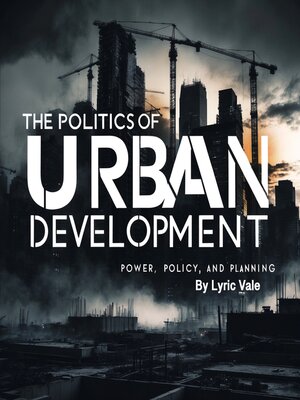The Politics of Urban Development
audiobook (Unabridged) ∣ Power, Policy, and Planning
By Lyric Vale

Sign up to save your library
With an OverDrive account, you can save your favorite libraries for at-a-glance information about availability. Find out more about OverDrive accounts.
Find this title in Libby, the library reading app by OverDrive.



Search for a digital library with this title
Title found at these libraries:
| Library Name | Distance |
|---|---|
| Loading... |
Urban development has long been a critical component of economic and social growth worldwide. As populations continue to increase and cities expand, the planning, management, and policies surrounding urban spaces become ever more complex. Urban development encompasses the physical, economic, and social transformation of cities, focusing on housing, infrastructure, transportation, and public spaces, while also addressing broader issues such as economic disparity, environmental sustainability, and social justice.
Historically, urbanization has been driven by industrialization, technological advancements, and shifts in global economic patterns. The migration of people from rural to urban areas in search of better job opportunities and living conditions has accelerated this process. As a result, cities have grown in both size and importance, becoming hubs for innovation, culture, and commerce. However, this growth has not come without challenges. Rapid urbanization often leads to overcrowded living conditions, increased pollution, traffic congestion, and the strain of public services.
At the heart of urban development is the relationship between power, policy, and planning. Political decisions and governmental priorities often shape the trajectory of cities, influencing everything from zoning laws and land use to infrastructure development and housing affordability. In this context, urban planning becomes not just a technical exercise, but a deeply political one, with differing interests—ranging from developers and business leaders to community groups and activists—competing for influence. The way these decisions are made can either foster inclusivity and equity or exacerbate social inequalities.







